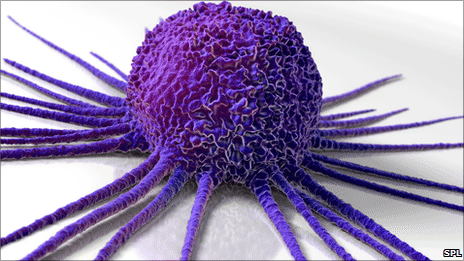科学家发现癌细胞如何靠“手肘”游离出肿瘤,这一线索用助于研发用于预防癌症扩散的新药。

癌细胞的“手肘”
他们称,识别出的JAK蛋白能帮助癌细胞产生转移的动力。像肌肉细胞一样,癌细胞靠伸缩运动驱动自身向前迁移,进而弥漫全身。
英国癌症研究中心称,这一研究提供了阻止癌症扩散的新途径。
当癌症扩散时,它们变得更难以治疗,并且作为继发性肿瘤更具有侵略性。
据认为,90%的癌症相关死亡由癌细胞转移引起的。
JAK 攻击
癌症研究所科学家研究了黑色素瘤(皮肤癌)迁移过程中涉及的得化学物质,发现肿瘤细胞能以2种方式迁移。
癌细胞靠“手肘”游离出肿瘤,或肿瘤自身能形成癌细胞逃离的通道。
研究负责人Chris Marshall 教授称,这2个过程受制于同一种化学物质,JAK分子提供这2种转移的动力。
JAK蛋白与多种癌症相关,一些药物已经被开发用于定位这种蛋白。
Marshall称,新的研究表明这些药物能阻止癌症的扩散。检测这些药物阻止癌细胞迁移是否有效以后,我们考虑在未来的几年把它用于临床治疗。(生物探索译 Pobee)
生物探索推荐:
Nature:肿瘤细胞周期调控的一种关键因子——CUEDC2
Nature Materials:“侦察”肿瘤的纳米粒子被研制出
生物探索推荐英文原文
Cancer discovery offers hope of tackling spread of disease
Scientists have discovered how cancerous cells can "elbow" their way out of tumours, offering clues for new drugs to prevent cancers spreading.
They say they have identified a protein called JAK which helps cancerous cells generate the force needed to move.
Writing in Cancer Cell, they say the cells contract like muscle to force their way out and around the body.
Cancer Research UK said the study provided fresh understanding of ways to stop cancer spreading.
When cancers spread, a process known as metastasis, they become more difficult to treat, as secondary tumours tend to be more aggressive.
It is thought that 90% of cancer-related deaths occur after metastasis.
JAK attack
Scientists at the Institute of Cancer Research, who investigated the chemicals involved in cell migration in melanoma - skin cancer - say cancerous cells can move in two ways.
They can "elbow" their way out of a tumour or the tumour itself can form corridors down which the cells can escape.
Lead researcher Professor Chris Marshall said both processes were being controlled by the same chemical.
"There is a common theme of using force, force generated by the same mechanism - the same molecule, called JAK," he said.
JAK is not a new culprit in cancer. It has been linked to leukaemia, so some drugs are already being developed which target the protein.
"Our new study suggests that such drugs may also stop the spread of cancer," Professor Marshall said.
"The test will be when we start to see whether any of these agents will stop the spread. We're thinking of clinical trials in the next few years."
Dr Lesley Walker, Cancer Research UK's director of cancer information, said: "A huge challenge in successfully treating cancer is stopping it from spreading around the body, and keeping cancer that has already spread at bay.
"Discovering how cancer cells can funnel grooves though tissues, to squeeze away from primary tumours and spread to new sites, gives scientists fresh understanding of ways to stop cancer spread - literally in its tracks."







